

Campaign for Good Urban Governance. Dublin to be studied in its capacity as a ‘smart city’ RESEARCHERS AT NUI Maynooth have been given €2.3m of funding for a major five-year project which will analyse how software and technology can influence life in a city.
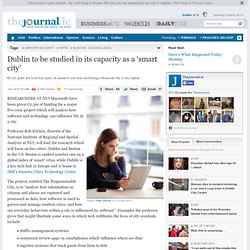
Professor Rob Kitchin, director of the National Institute of Regional and Spatial Analysis at NUI, will lead the research which will focus on two cities: Dublin and Boston in the US. Boston is ranked number one on a global index of ‘smart’ cities while Dublin is a key tech hub in Europe and is home to IBM’s Smarter Cities Technology Centre. The project, entitled The Programmable City, is to “analyse how information on citizens and places are captured and processed as data, how software is used to govern and manage modern cities, and how our everyday behaviour within a city is influenced by software”. Examples the professor gives that might illustrate some ways in which tech infiltrates the lives of city residents include: Prof Kitchin said: Read: New app aims to help those with sight loss navigate the city> Already a fan?
ICTs and Urban Poverty. Inclusive Cities. Inclusive Urban Governance for informal Slum Dwellers. 12 September Print New programme to strengthen city governments at World Urban Forum Naples – Cities hold enormous potential for humanity, bringing greater and more equitable access to services, promoting economic growth, reducing impact on the environment and advancing human development.
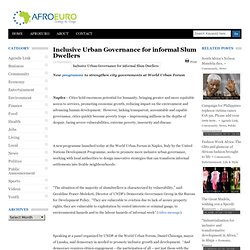
However, lacking transparent, accountable and capable governance, cities quickly become poverty traps – imprisoning millions in the depths of despair, facing severe vulnerabilities, extreme poverty, insecurity and disease. A new programme launched today at the World Urban Forum in Naples, Italy by the United Nations Development Programme, seeks to promote more inclusive urban governance, working with local authorities to design innovative strategies that can transform informal settlements into livable neighbourhoods. Jane Weru: Security of Tenure for the Urban Poor: A Critical Tool for Sustainable Social and Community Resilience. Nairobi is a thriving metropolis that unfortunately suffers from high levels of inequality and violence.
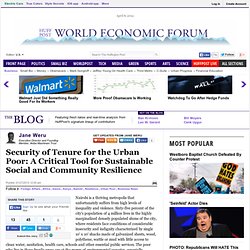
Sixty-five percent of the city's population of 4 million lives in the highly marginalized densely populated slums of the city, where residents face conditions of considerable insecurity and indignity characterized by single 10' x 10' shacks made of galvanized sheets, wood, polythene, wattle or mud with little access to clean water, sanitation, health care, schools and other essential public services.
The poor who live in these fragile areas are at the mercy of environmental vagaries, especially flooding. Overcrowding raises the risk of respiratory illness. Contaminated water supply and unsanitary waste disposal causes gastro-intestinal problems, skin ailments, cholera, typhoid and other infectious diseases. Malnutrition is highly visible among children. The Mukuru slum in Nairobi sits on private land. The Inclusive City. UCL Discovery - The Inclusive City: sustainability, urban design and the cultures of ageing.
Urban Governance: Why Gender Matters. Executive Summary Urban governance must be gender-sensitive if it is to be equitable, sustainable and effective.
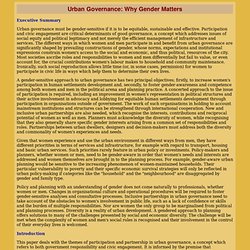
Participation and civic engagement are critical determinants of good governance, a concept which addresses issues of social equity and political legitimacy and not merely the efficient management of infrastructure and services. The different ways in which women and men participate in and benefit from urban governance are significantly shaped by prevailing constructions of gender, whose norms, expectations and institutional expressions constrain women's access to the social and economic, and thus political, resources of the city. Most societies ascribe roles and responsibilities to women and men differentially but fail to value, or even account for, the crucial contributions women's labour makes to household and community maintenance.
Policy and planning with an understanding of gender does not come naturally to professionals, whether women or men. Introduction. Urban Planning for the Informal Economy. “Just as the policy makers encourage bio diversity, they should encourage economic diversity”. – Ela Bhatt, founder of the Self-Employed Women’s Association, suggesting policy makers encourage “hybrid economies” in which micro-businesses co-exist alongside small, medium, and large businesses “Incorporating and managing, rather than controlling and marginalising, the unregulated economies of the poor is an imperative of 21st Century governance.” – Prominent urbanists Jo Beall, Owen Crankshaw and Sue Parnell.
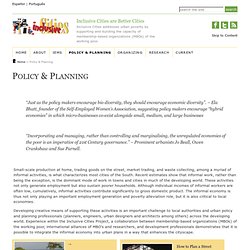
Small-scale production at home, trading goods on the street, market trading, and waste collecting, among a myriad of informal activities, is what characterizes most cities of the South. Recent estimates show that informal work, rather than being the exception, is the dominant mode of work in towns and cities in much of the developing world. These activities not only generate employment but also sustain poorer households. Will Ghana's Hope City join Africa's herd of white elephant projects?
Hope City does not yet exist, except as shimmering images of giant beehive towers bathed in a golden light.
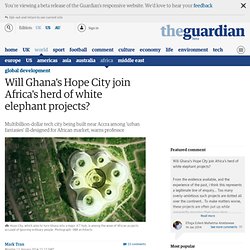
But Ghana is pressing ahead to build this $10bn (£6.6bn) technology city outside the capital, Accra. Designed by OBR architects, the city will consist of six towers, including a 75-floor, 270m-tall (885ft) building, the highest in Africa, where 25,000 people will live and 50,000 will work. There have been teething problems, with the site moved to a larger one at Pampram. Residents at the original location, Dunkunaa, claim the project had incurred the displeasure of the gods when the developers refused to acknowledge the chiefs and elders of the area.
That could be the least of Hope City's problems, warns Professor Vanessa Watson of the University of Cape Town. In the paper African urban fantasies: dreams or nightmares? "The bulk of the population in sub-Saharan African cities is extremely poor and living in informal settlements," she writes.